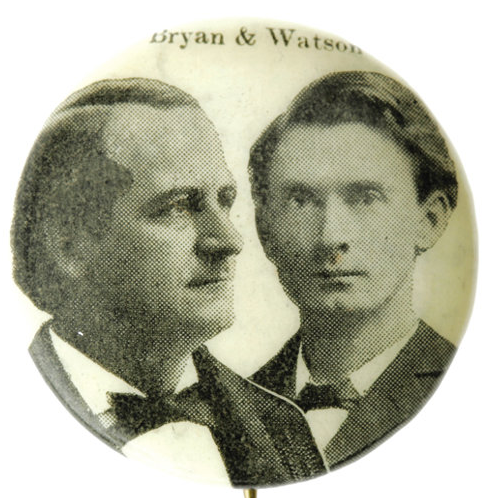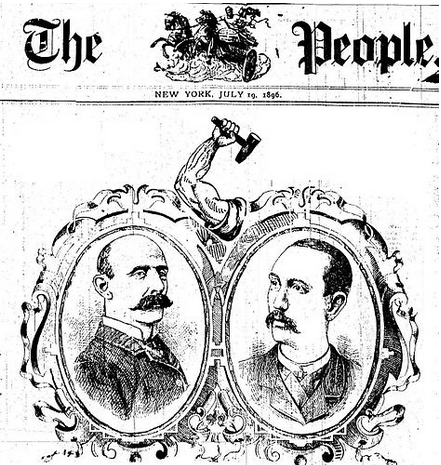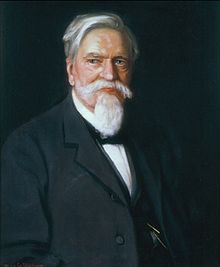Showing posts with label election of 1896. Show all posts
Showing posts with label election of 1896. Show all posts
Tuesday, June 4, 2019
James Haywood Southgate
James Haywood Southgate, July 12, 1859 (Norfolk, Va.) – September 29, 1916 (Eno, NC)
VP candidate for National Prohibition Party (aka Liberty Party aka Silver Prohibitionists aka Free Silver Prohibitionists aka National Party) (1896)
Running mate with nominee: Charles Eugene Bentley (1841–1905)
Popular vote: 13,968 (0.10%)
Electoral vote: 0/447
The campaign:
The Prohibition Party was not immune from the 1896 trend of relaignments and party splits. Their convention was divided by "narrow-gaugers" who wanted to focus primarly on anti-alcohol issues and "broad-gaugers" who felt the Party should also embrace many policies that echoed the Populists. In short, the "narrow-gaugers" won out ticket and the "broad-gaugers" bolted and formed their own splinter party, nominating Bentley and Southgate. They also absorbed the members of the embryonic National Reform Party.
The issues they added to their anti-alcohol platform included abolition of the Electoral College, women's suffrage, English as the only language to be used in schools, immigration laws to exclude paupers and criminals, bi-metalism, government control of railroads and telegraph, an income tax, and implementation of initiative and referendum systems.
They were on the ballot in 16 states, generally placing in at or near the bottom in the results. Their best tally was in New Jersey at 1.51%. The only state where they gained more votes than the regular Prohibition Party where they were both on the ballot was in Arkansas.
Election history: none.
Other occupations: banking, insurance, trustee for Trinity College (Duke University),
Buried: Maplewood Cemetery (Durham, NC)
Notes:
Family moved to NC in 1861.
Was a Democrat prior to joining the Prohibition Party in 1885.
In the same cemetery as actress Anita Morris (1943-1994) from the movie Ruthless People.
Methodist
Led the successful effort as a Trinity College trustee to protect the academic freedom of faculty John
Spencer Bassett when the teacher praised Booker T. Washington in 1903.
Hale Johnson
Hale Johnson, August 21, 1847 (New Richmond, Ind.)– November 4, 1902 (Bogota, Ill.)
VP candidate for Prohibition Party (1896)
Running mate with nominee: Joshua Levering (1846–1935)
Popular vote: 131,312 (0.94%)
Electoral vote: 0/447
The campaign:
The Prohibition Party was not immune from the 1896 trend of realignments and party splits. Their convention was divided by "narrow-gaugers" who wanted to focus primarily on anti-alcohol issues and "broad-gaugers" who felt the Party should also embrace many policies that echoed the Populists. In short, the "narrow-gaugers" won out and nominated the Levering/Johnson ticket and the "broad-gaugers" bolted and formed their own splinter party.
The Prohibition Party single-issue platform for 1896 was short and to the point. Campaigning with an unusual gusto for a third party VP candidate, Johnson visited 30 states.
They were on the ballot in all but five states and placed 4th in the popular vote following the National Democratic Party. If the Prohibition Party had not split they would have been in third place nationally.
Their best showing was in Georgia with 3.37%.
Election history:
1882 - Illinois State Senate (Prohibition Party) - defeated
1884 - Illinois Attorney General (Prohibition Party) - defeated
1886 - US House of Representatives (Ill.) (Prohibition Party) - defeated
1888 - US House of Representatives (Ill.) (Prohibition Party) - defeated
1892 - US House of Representatives (Ill.) (Prohibition Party) - defeated
1896 - Governor of Illinois (Prohibition Party) - withdrawn or defeated
<1900>-1902 - Mayor of Newton, Ill.
Other occupations: soldier (Indiana Infantry during the Civil War), farmer, attorney, teacher
Buried: Riverside Cemetery (Newton, Ill.)
Notes:
Family moved to Illinois in 1865.
Delegate to the Republican Party National Convention in 1884 but was also already active with the Prohibition Party which he joined when the former party failed to endorse national prohibition in
their platform.
Shot to death while attempting to a collect a debt.
Named after John P. Hale who was later Free Soil Party candidate for US President 1852.
Was a member of the Disciples of Christ.
Monday, June 3, 2019
Thomas Edward Watson
Thomas Edward Watson, September 5, 1856 (Thomson, Ga.)– September 26, 1922 (Washington, DC)
VP candidate for People's Party (1896)
Running mate with nominee: William Jennings Bryan (1860-1935)
Popular vote: 222,583 (1.6%)
Electoral vote: 27/447
The campaign:
With the nomination of William Jennings Bryan the Democratic Party had managed to co-opt many issues long advocated by third parties. The Democratic ticket was endorsed by the single-issue Silver Party, but the People's Party found themselves in a bind. Would they split the vote and help elect McKinley, or would they endorse Bryan?
What they came up with was something of a compromise that in the end worked for no one. They endorsed Bryan but wished not to tolerate his corporate industrialist running mate Arthur Sewall. The Vice-Presidential nomination was given to fiery former Congressman Thomas E. Watson of Georgia. So Bryan had two running mates from two different political parties.
Bryan and Watson were reluctant comrades. The standard bearer basically ignored his Populist VP during the campaign even though Watson was active in his electioneering efforts. Watson included his rival Sewall among the targets in his political attacks.
In a result where the word "fiasco" and "debacle" are frequently used by historians, Bryan lost, Watson began his political journey into racism and religious bigotry, and the People's Party began their collapse.
Although the Bryan/Watson ticket did not garner a high percentage of popular votes, they did earn a respectable tally of 27 in the Electoral College: Arkansas 3, Louisiana 4, Missouri 4, Montana 1, Nebraska 4, North Carolina 5, South Dakota 2, Utah 1, Washington 2, Wyoming 1.
Election history:
1882- Georgia General Assembly (Democratic)
1891-1893 - US House of Representatives (Ga.) (Alliance Democrat/People's Party)
1892 - US House of Representatives (Ga.) (People's Party) - defeated
1894 - US House of Representatives (Ga.) (People's Party) - defeated
1895 - US House of Representatives (Ga.) (People's Party) - defeated
1898 - US House of Representatives (Ga.) (Populist Party) - defeated
1900 - US House of Representatives (Ga.) (Populist Party) - defeated
1904 - US President (Populist Party) - defeated
1908 - US President (Populist Party) - defeated
1911 - Democratic primary US Senate (Ga.) - defeated
1918 - US House of Representatives (Ga.) (Democratic) - defeated
1922-1922 - US Senate (Ga.) (Democratic)
Other occupations: school teacher, attorney, presidential elector (Ga.) for Cleveland 1888, newspaper editor, magazine publisher, author, novelist.
Buried: Thomson City Cemetery (Thomson, Ga.)
Notes:
While in Congress was one of the forces behind the creation of Rural Free Delivery (the postal RFD)
Was considered a progressive inclusionist in the 19th century but during the 20th century had shifted
to a white supremacist, anti-Catholic, antisemitic and Nativist political stand.
He opposed America's entry into World War I and the draft which made him sympathetic to the
Socialists (who he had earlier shunned). The Federal postal system (including RFD no doubt) ceased delivering his publications.
His father was a CSA Army wounded veteran.
Watson sent his child to Catholic school while attacking the Church at the same time.
Sunday, June 2, 2019
Matthew Maguire
Matthew Maguire, June 28, 1850 (some sources have 1855) (Manhattan, NY, or, Atlantic Ocean enroute to USA) - January 1, 1917 (Paterson, NJ)
VP candidate for Socialist Labor Party (1896)
Running mate with nominee: Charles H. Matchett (1843-1919)
Popular vote: 36,373 (0.26%)
Electoral vote: 0/447
The campaign:
The 1896 SLP slogan was: "Vote for the overthrow of Capitalism! Vote for Cooperative Commonwealth!" Their platform was against child labor, supported equal wages for equal work for men and women, and a progressive income tax.
Matchett, who has been the SLP VP nominee in 1892 ran a spirited campaign. They were on the ballot in 20 states but only cracked 1% in three: New York (1.24%), New Jersey (1.07%) and Rhode Island (1.02%). In all the races except New York where they placed 4th, they were outpolled by the other third parties and landed in 5th or 6th place.
Election history:
1880 - US House of Representatives (NY) (Greenback/Socialist Labor Fusion) - defeated
1894-1898 - Alderman (Paterson, NJ) (Socialist Labor Party)
1896 - Socialist Labor Party nomination for US President - defeated
1898 - Alderman (Paterson, NJ) (Socialist Labor Party) - defeated
1898 - Governor of New Jersey (Socialist Labor Party) - defeated
Other occupations: machinist, newspaper publisher and editor, labor organizer
Buried: Holy Sepulchre Cemetery (Totowa, NJ)
Notes:
Left the Socialist Labor Party to join the Socialist Party of America.
Possible creator of Labor Day.
Catholic.
Was initially politically active with the Greenback Party.
If SLP had won, Maguire's alleged birth while enroute across the Atlantic to Irish parents might
have been a Constitutional issue for eligibility for office.
Saturday, June 1, 2019
Simon Bolivar Buckner
Simon Bolivar Buckner, April 1, 1823 (Munfordville, Ky.) – January 8, 1914 (Hart County, Ky.)
VP candidate for National Democratic Party (1896)
Running mate with nominee: John M. Palmer (1817-1900)
Popular vote: 134,645 (0.97%)
Electoral vote: 0/447
The campaign:
Unable to tolerate the presence of William Jennings Bryan at the top of the Democratic Party ticket, some Bourbon Democrats bolted and formed the National Democratic Party. Sen. John Palmer of Illinois was 79, former Kentucky Governor Simon Bolivar Buckner was 73, and together they still hold the record for greatest combined age of any ticket. Palmer was a former Union general and Buckner a well known CSA general.
The Party painted itself as the bastion of Democratic Party traditionalism supporting free trade, limited government, and the gold standard.
Palmer and Buckner were vigorous campaigners but faced a bit of ageist reaction from some quarters. Apparently there was some cooperation with the McKinley campaign, but the long-range goal of the Bourbons was to recapture the Democratic Party. This they did in the 1904 election.
They were on the ballot in over 30 states, with their best showing in New Hampshire (4.21%).
Election history:
1887-1891 - Governor of Kentucky (Democratic)
Other occupations: military officer (US Mexican War, Civil War), real estate manager, CSA Army general, fire insurance company president, newspaper editor, delegate to the Democractic National Convention 1868,
Buried: Frankfort Cemetery (Frankfort, Ky.)
Notes:
If elected, Buckner would have become President upon the death of Palmer Sept. 25, 1900.
Graduated from the US Military Academy at West Point in 1844, 11th in his class.
Wounded in the US Mexican War
Member of the Aztec Club
Surrendered to his old friend US Grant at Fort Donelson in 1862 and was released as part of a prisoner exchange five months later. Wrote poetry while imprisoned.
As Governor of Kentucky he had to deal with the Hatfield-McCoy War.
Endorsed Republican William Howard Taft in 1908.
Was the last surviving CSA Lt. General.
His only son Simon Bolivar Buckner Jr. was a Lt. General killed at Okinawa in 1945, the highest ranking US officer to die in battle.
Was a pallbearer for US Grant and helped pay funeral expenses.
Buried in the same cemetery where Daniel Boone may or may not be buried.
Was the first (1862) and one of the last (1865) CSA generals to surrender.
Subscribe to:
Comments (Atom)




































